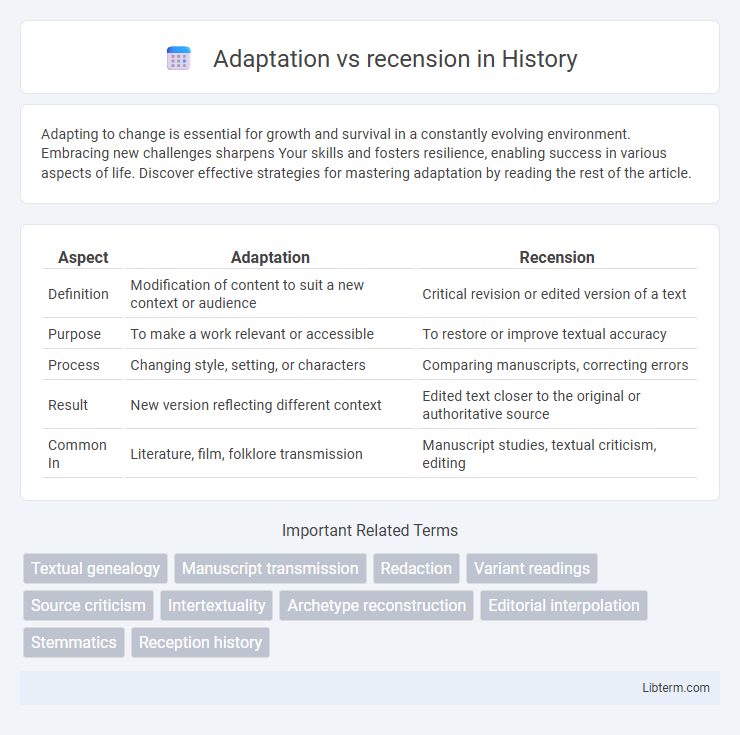Adapting to change is essential for growth and survival in a constantly evolving environment. Embracing new challenges sharpens Your skills and fosters resilience, enabling success in various aspects of life. Discover effective strategies for mastering adaptation by reading the rest of the article.
Table of Comparison
| Aspect | Adaptation | Recension |
|---|---|---|
| Definition | Modification of content to suit a new context or audience | Critical revision or edited version of a text |
| Purpose | To make a work relevant or accessible | To restore or improve textual accuracy |
| Process | Changing style, setting, or characters | Comparing manuscripts, correcting errors |
| Result | New version reflecting different context | Edited text closer to the original or authoritative source |
| Common In | Literature, film, folklore transmission | Manuscript studies, textual criticism, editing |
Introduction to Adaptation and Recension
Adaptation involves modifying a text or work to fit a new context, audience, or purpose, often resulting in significant changes to the original content. Recension refers to the process of critically editing and revising a text to produce an authoritative version, emphasizing preservation and accuracy. Both concepts play crucial roles in textual scholarship, with adaptation focusing on transformation and recension on faithful restoration.
Defining Adaptation in Literature and Media
Adaptation in literature and media refers to the process of transforming a source material, such as a novel or play, into a different format like film, television, or stage, while preserving its core narrative and themes. This transformation often involves creative reinterpretation to suit the new medium's capabilities and audience expectations, emphasizing narrative fidelity and thematic resonance. Unlike recension, which involves revising or editing texts within the same medium to establish authoritative versions, adaptation entails multimedia transmutation and recontextualization of the original work.
Understanding the Concept of Recension
Recension refers to the critical process of revising and editing a text to establish an authoritative version, often by comparing multiple manuscripts to correct errors and inconsistencies. Unlike adaptation, which involves modifying content to suit a different context or audience, recension strives to preserve the original meaning while enhancing textual accuracy and authenticity. This scholarly practice is fundamental in fields such as philology and textual criticism, ensuring that historical and literary works are transmitted with fidelity.
Key Differences Between Adaptation and Recension
Adaptation involves modifying content to suit a different context, audience, or purpose, often resulting in significant changes to the original material. Recension refers to the critical revision and comparison of texts to establish an authoritative version, focusing on preserving the original meaning and structure. Key differences include adaptation's emphasis on transformation and audience relevance versus recension's focus on textual accuracy and authenticity.
Historical Evolution of Adaptations and Recensions
The historical evolution of adaptations and recensions reflects distinct processes in textual transmission and cultural reinterpretation. Adaptations transform source material across different media or cultural contexts, emphasizing creative reinterpretation to suit new audiences, while recensions involve critical revision or editorial changes within textual traditions aimed at preserving or standardizing content. Examining medieval manuscripts, for instance, reveals how recensions stabilized religious texts, whereas Renaissance adaptations reimagined classic works to reflect contemporary values and artistic trends.
Purposes and Motivations Behind Adaptations
Adaptations are driven by the desire to make a work accessible and relevant to new audiences, cultures, or contexts, often involving significant changes in narrative, style, or medium to align with contemporary tastes or technological advancements. Recensions focus on the preservation and clarification of original texts through critical editing, aiming to restore or maintain the author's intended meaning and textual integrity. While adaptations prioritize creative reinterpretation and audience engagement, recensions emphasize scholarly accuracy and fidelity to the source material.
The Role of Recensions in Textual Transmission
Recensions play a crucial role in textual transmission by preserving and standardizing texts across different manuscript traditions, ensuring the integrity and consistency of literary works over time. Unlike adaptations that modify content to fit new contexts or audiences, recensions focus on critical editing and restoring original meanings based on comparative manuscript analysis. This process helps scholars trace textual history, identify interpolations, and maintain authoritative versions within literary and historical studies.
Adaptation vs Recension: Impact on Original Material
Adaptation transforms original material by altering content, style, or context to fit new formats or audiences, often leading to significant changes in meaning and presentation. Recension involves critical revision or editing of a text to improve accuracy, coherence, or authenticity while preserving its core content. The impact on original material differs as adaptation reinterprets and reshapes, whereas recension refines and clarifies without fundamentally changing the source.
Case Studies: Famous Examples of Adaptations and Recensions
Adaptation involves modifying a work to fit a different context or audience, as seen in Shakespeare's *Romeo and Juliet* adapted into the Bollywood film *Goliyon Ki Raasleela Ram-Leela*, which transforms the setting and cultural references while preserving core themes. Recension refers to the critical revision of a text to produce a more accurate or authoritative version, exemplified by the numerous recensions of the *Mahabharata* that consolidate various manuscript traditions into standardized editions. Case studies of adaptations and recensions highlight the dynamic processes through which stories evolve across cultures and time, revealing the interplay between preservation and innovation in literary transmission.
Conclusion: Choosing Between Adaptation and Recension
Choosing between adaptation and recension depends on the purpose of the text revision and the intended audience. Adaptation modifies content extensively to fit new contexts or cultural settings, enhancing relevance and accessibility, while recension aims to restore or refine original texts for accuracy and authenticity. Understanding the nuances of each method ensures informed decisions in preserving or transforming textual heritage effectively.
Adaptation Infographic

 libterm.com
libterm.com